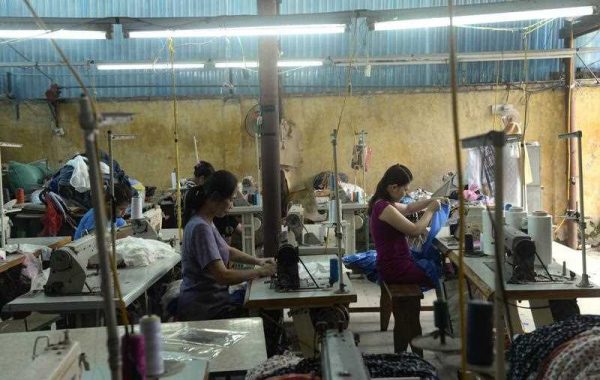This decree specifies how to resolve strikes that do not follow the procedures set out in the Labour Code. The procedures ensue when a collective dispute at a company is unaddressed. The dispute must relate to ‘interests’ — that is, benefits that are beyond the labour contracts or are not legally binding on the employers. Under the Labour Code, the procedure starts with the collection of workers’ opinions, either by the company unions or workers’ representatives. Then a ballot is conducted, and if more than 50 per cent of workers agree to go on strike, they may legally proceed with their collective action.
In reality all strikes are illegal because they do not strictly stem from disputes over interests, nor do they follow the legal procedures. It is almost impossible to envisage a legal strike, led by company or corporatist unions, due to institutional constraints. Though claiming to represent workers, company unions have their pockets tied to their bosses and corporatist unions have theirs tied to the state.
The Vietnam General Confederation of Labour is the only legitimate trade union in Vietnam. It has branches across all administrative levels of the state: federations of labour in cities and provinces, and upper-level unions in districts and municipalities, and in industrial zones. Leadership positions in upper-level unions are held by members of the Communist Party. Those branches are then in control of company unions in their areas. Employers often appoint leaders in company unions, sometimes with assistance from upper-level unions.
It is quite common for workers not to know anyone in the executive committee of their company union. They know the unions exist, because a tiny amount of their monthly wage is deducted in union fees, normally between 10,000–20,000 Vietnamese dong (US$0.50–1). Sometimes they also receive gifts for special occasions, are paid visits while on sick leave, or hear about recreation events held by the unions.
The new government decree rules that when an illegal strike breaks out, the employer is required to immediately report to the district or municipal government and upper-level unions. Those bodies will examine the situation and within 24 hours, the labour bureau will finalise a report and inform higher authorities. This process shall end with the city or provincial government issuing an announcement that the strike has gone against legal procedures.
So how will these changes impact workers’ collective actions?
The court now has the power to rule over the lawfulness of strikes taken by the local government. Employers no longer need to lodge their paperwork with the court, only to have their cases thrown out for lack of evidence. They only need to report to local authorities and can have the unlawful strike verdict issued within a day.
This may seem to deter workers from collective actions. The punishment, as set out in the decree, is that workers will not be paid for the time they participate in strikes. But will workers really be deterred by having a few days’ pay deducted if by striking illegally they stand a chance of having their basic wages increased for the next 12 months? Especially when, the success rate of strikes can be very high. For instance in Dong Nai province, where the author completed her fieldwork, about 80 per cent of strikes in the past few years have resulted in a win, in part or in full, for the workers.
Once a strike has been settled, the employer shall calculate damages and costs incurred in recovering from the strike. They will then proceed to request that the unions that organise strikes pay compensation. In reality no strike is legal, nor union-organised. So if this provision is to deter unions from organising strikes, it has already succeeded.
There is another practical problem. So far, industrial provinces have put in place ‘strike action teams’, which are coordinated by upper-level unions, labour mediators and relevant authorities. They try to be present at the strike scene immediately to facilitate the resolution process, which could last from a few hours to a number of days, to achieve an outcome that makes workers happy enough to resume working. Under the new government decree, these action teams shall only begin operating within 12 hours after the city or provincial government has announced a strike is illegal — a process that has already swallowed up to 24 hours. This may mean that strikes end up taking longer to resolve than previously.
While the Vietnamese government considers labour disputes to be part of market–labour relations, it seems reluctant to leave them to be resolved by the conflicting parties. Instead of a highly bureaucratic process that inhibits the right to strike, what is needed is an effective channel for dialogue between workers and management, facilitated by company unions. The form of workplace dialogues has been legislated, but in most places they have yet to mend the lack of trust between workers and company unions.
Tu Phuong Nguyen is a PhD candidate at the Department of Political and Social Change at The Australian National University.

